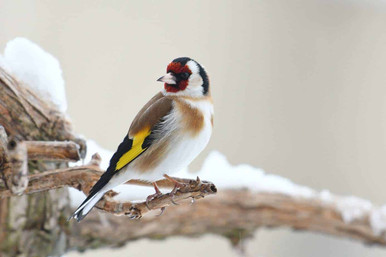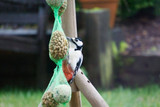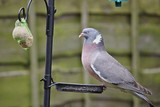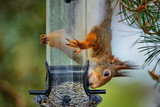Feeding Garden Wildlife In Snow
Feeding Garden Wildlife in Snow
Feeding garden wildlife in the snow. Most of the wildlife in the UK, including birds, are used to cold winter conditions, and perfectly adapted to survive. However, that doesn’t mean it is easy for them and if we have unusually long or tough winters, some wildlife can start to suffer. Feeding the birds in colder weather conditions, especially snow, is important as natural food sources will be in short supply. Read on to find out how you can help our feathered friends and other garden creatures in snowy weather.Bird Behaviour In Snow & Winter
The first thing you may notice about birds in colder weather is their habits change, especially their ‘social lives’. In winter, many common birds including blue tits, goldcrest, and wrens will gather in loose flocks. Gathering is useful for several reasons. Firstly, safety comes in numbers. With no leaves on trees, small birds become more visible to predators. Gathering means more pairs of eyes to keep watch! A group of birds will also have more success when it comes to locating food. Food is scarce in winter so again, with more pairs of eyes to look out for food, birds benefit by grouping. Forming flocks is also practical when it comes to bedtime for birds – many species will huddle together at night to keep each other warm. This is especially important for tiny birds, such as the wren. Famously, a nest box was once found to contain 50 wrens snuggling together! It isn’t even uncommon to see groups of robins – robins are famously territorial but in cold weather, needs must. Although you will still them gathered around bird feeders fighting each other off. When winter is hardest and there is snow on the ground you may notice birds coming to your garden more often. That is if you regularly feed them. As natural food sources become scarce in winter, birds rely on kindly people feeding them. We only have a few types of bird that hide food for winter, the Jay, for example, most other birds need to eat every day and quite a lot too. Smaller birds especially need to consume a large amount of food every day to keep their fat reserves up for cold nights.
Feeding Garden Wildlife In Snowy Weather
Some animals in the UK, such as door mice and squirrels hibernate in winter but even animals that hibernate will occasionally come out for food. You can still see hedgehogs year-round if you supply them with food. A hedgehog food mixture can be put out for as long as you notice they are taking the food. Badgers can still be seen in winter too as they don’t hibernate. They may reduce their activity when the weather is very cold but so long as they are visiting your garden, you can help them out by leaving badger food. As mentioned, feeding birds is essential in winter, even more so when it snows as birds struggle to find food sources. if you decide to feed birds in winter, it is important to keep up with feeding once the birds come routinely as they will remember to visit your garden and they can’t afford to waste a visit when the weather is cold, and energy needs to be conserved. You might notice birds visiting your garden that you don’t normally see in summer – this is because birds that usually live in the countryside may move closer to garden when the weather is especially harsh, seeking shelter and food. This increased variety of species mean it is important to leave out a selection of bird food in your garden so there is something available for everyone. Or you can offer mixed birdseed that has been designed to be attractive to a wide range of birds. Suet bird food, including pellets, fat balls, blocks, and filled coconuts is a great bird food for snowy weather as suet is high in fat and gives birds boosts of energy. Whilst we humans try to avoid too much fat, birds have a thin layer of fat underneath their skin that is essential for staying alive though winter. High energy suet and fat balls will help birds keep their bodies in tip-top condition. Finally, in addition to feeding wild birds, it is important to keep an ice-free water source for them. Even when it snows birds still need to bathe and drink fresh water. You can help them by knocking snow and ice off water dishes, ponds, and birdbaths.14th Jan 2021
Explore Popular Articles
-
8 Easy Ways to Attract Woodpeckers to Your Garden
8th Apr 2024Woodpeckers are among the most interesting birds known for their drumming sound and bright colours.
-
How to Protect Your Bird Feeders from Pigeons ?
28th Mar 2024You must have noticed damaged feeding ports, hanging mechanisms, perches, lids and bottoms. Who coul
-
5 Foolproof Ways to Rat-Proof Your Bird Feeder
18th Mar 2024Building a bird-friendly environment is a delightful endeavour, but it involves the responsibility o




